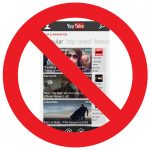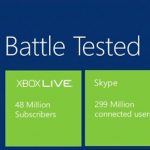How to delete or disable (almost) all of your accounts from the cloud

Over the years I have amassed a vast collection of unused accounts on websites. I am sure you have too. I have signed up for various online services -- email, cloud storage, content streaming, social networking and more -- with the prospect of trying new things or replacing old ones. The antiquated accounts got left behind, abandoned or forgotten.
The downsides, at least for me, are the constant email reminders which I receive, trying to pull me back in, or, worse, the likelihood of exposing personal information to hackers (if I don't use something then I surely will not change my password frequently or enable new security features). The solution? The unused accounts have to go. And Just Delete Me is one of the best services to help do that.
According to Google, your Windows Phone is a feature phone

Google is renowned for its lack of Windows Phone support. The search giant has only released one app for the tiled smartphone operating system, and that is basically just a portal to the mobile Google Search page. Windows Phone users get none of the popular apps launched on Android or iOS -- YouTube, Gmail, Google Drive or Google Now. That doesn't look like it will change in the near future, unless Windows Phone's market share is significant enough for the company to notice (which is a far-fetched scenario anyway).
Sadly, Google also shows its lack of Windows Phone support at browser level. Those who wish to access the Gmail website from a handset running the tiled OS are greeted with a plain ugly interface, while Android, iOS and even BlackBerry users get treated to the latest smartphone-optimized design. As a Windows Phone user I had hoped that this would change, but it looks like Google has other plans in mind, as, surprisingly, it considers the tiled smartphone OS to be of the feature phone kind.
5 big myths surrounding computer security and HIPAA compliance

For those in the States, the mad dash to compliance is unquestionably on. After years of taking a "wait and see" approach to Health Insurance Portability and Accountability Act (HIPAA) regulations surrounding medical office technology, healthcare providers (and related covered entities) are scrambling to get their systems and procedures in order. Big Brother has officially set a September 23, 2013 deadline for most new rules that put into place heightened protocols for how patient information (PI) is shared as well as how notifications about breaches need to be handled, among other things.
Naturally, a lot of my consulting clients in the healthcare industry are reaching out for professional help on how to get their IT systems in line as these deadlines approach. One of the biggest facets of the new HIPAA laws, which affects companies like mine that provide hands-on IT consulting, is that for the first time ever we are being considered "covered entities" in the same boat as the healthcare outlets themselves.
The most popular stories on BetaNews this past week

Looking at the the biggest stories on BetaNews from August, 18 - 24, 2013. Perhaps the biggest news from the last seven days -- at least in part because it came as such a surprise to most people -- was the announcement that Steve Ballmer intends to resign from Microsoft within the year. The CEO is planning to step down as soon as a suitable replacement is found, but there has been speculation that Ballmer may have been pushed rather than opting to jump.
Getting my hands on a Surface Pro for the first time gave me an opportunity to try out Windows 8 as a touchscreen operating system. Despite loving the Surface in general, I pondered whether the use of the same version of Windows 8 as on desktop machine may have been what's stopping Microsoft’s convertible devices from becoming more popular. At the same time, Brian fell in love with the Lenovo Yoga, citing Windows 8 as one of the computer’s strengths.
The most popular stories on BetaNews this past week

Looking at the the biggest stories on BetaNews from August, 11 - 17, 2013. This week there has been a lot of Microsoft related news setting tongues wagging -- and it's been something of a rollercoaster. Early on in the week we got a sneak peak at what to expect in the upcoming Windows 8.1 update after a new build leaked online. Build 9471 includes a number of changes from the official Preview, including new tutorials, extra personalization options, changes to a few of the built-in apps and integrated Skype.
Not long after the leak version was discovered, Microsoft went on to talk about creating a unified experience across different Microsoft and Windows devices and services. And for anyone who is sick of the Windows 8.1 hype there was some good news -- the official release date is only a couple of months away, after which things should start to quieten down.
Microsoft shows off Skype and more in Windows 8.1

The slow but steady plod towards Windows 8.1 continues. What began with leaks later became a full-blown Preview edition and has now made it back into leak status again with another build that hit the web unexpectedly. Couple that with a solid release date and you have almost everything you need to know.
While much was unveiled in the latest build, today Microsoft makes this official, announcing what it terms "one experience". This is an attempt to give users the same thing across devices, be it a computer, tablet or smartphone.
Google once again blocks YouTube app for Windows Phone

When I first got my Nokia Lumia 928, the YouTube app was already unavailable at the request of Google, so I never got a chance to try it. However, the Windows Phone community was quick to tell me how great it was. Sadly, it was replaced with a different "app" that only served as a shortcut to the mobile YouTube site.
Yesterday, the full version of the app returned to the Windows Phone Store so I excitedly downloaded it. However, the app never worked for me. Coincidentally, this was during the Outlook.com outage so I assumed it might be related. Today, I learn that they were not related -- Google has actually disabled the video sharing app!
Microsoft is at it again -- launches new Scroogled video

Microsoft's Scroogled campaign, an attack on rival Google, is still in full-swing, despite taking turns between entertaining and ridiculous. My colleague Wayne Williams described it as "sad and embarrassing", but I am not so sure I would go quite that far, though neither will I defend the software maker in this battle.
Now Microsoft launches its latest attack -- again going after Gmail. This time around, the company goes after the new tabbed design in Gmail, though it focuses on treating the email service on the whole as a trojan horse for advertising -- not a new claim, only a new video for an old accusation. The video, of course, ends with the plea to use Outlook.com.
Microsoft aims squarely at Apple with new SkyDrive promo

In June of 2012 Apple officially shut down MobileMe, migrating customers to iCloud. With storage space now being downgraded, the market apparently seems right to Microsoft to take advantage of cloud customers by offering its own alternative, in the form of SkyDrive -- or the service soon to be formerly known as SkyDrive.
The only official announcement came from the service's official Twitter account, simply asking a question and offering a solution -- "did Apple cancel your extra MobileMe storage? Fwd the downgrade email to [email protected] for an extra 15GB of SkyDrive for 1 year".
Battle Tested: Microsoft’s cloud services by the numbers

During day two's keynote at the Microsoft Build 2013 developer conference, Server and Tools Business President Satya Nadella talked about the SaaS (Software as a Service) applications Microsoft runs.
In particular he focused on the scale and diversity of the company’s daily work in the cloud, while a "Battle Tested" slide displayed the all-important numbers for Xbox Live, Skype, Outlook.com, Office 365, SkyDrive and Bing.
Hey Microsoft, here’s another ball! Try not to drop this... oh

If I worked for Microsoft, and my sole job was to come up with products that divided opinion and alienated many previously loyal users, I reckon I would be due a promotion about now.
While some divisions within Microsoft are doing a great job (Bing and Outlook.com spring to mind), you have to wonder what the bloody hell is going on when the tech giant is able to so badly foul up not only Windows but Xbox too.
Why can't anyone get email services right?

Email is often cited as the killer application that turned the Internet from a novelty for geeks into a serious business tool. Why then is it so hard to get right? The recent changes to Gmail and Yahoo Mail sparked a bit of debate amongst the BetaNews team as to what makes a good email service. What are the features we really want and what can we happily live without?
Until around 12 years ago you were most likely to access your email via a client program, downloading messages from the server and dealing with them on your PC. This was mostly down to slow dial-up connections which meant that you weren’t online all the time. Since then -- for personal mail at least -- there’s been a shift towards webmail services. Mainly this is thanks to broadband connections and ever increasing storage allowances which mean that you never have to throw anything away. But despite this shift a whole generation of mail users still think of Outlook Express, with its classic three-pane view, as the way email should be.
Office 365 for Business: Cloud email (finally) ready for primetime [review]

Merely a half year ago, my thoughts on Office 365 were salty at best. Outages continuously plagued the service. Its treatment of browser-based users who wished to forego desktop versions of Outlook and Office disappointed. And spam filtering was bottom tier, proving to do little in stemming waves of junk mail. In the February 2013 release, Microsoft turned a new page and proved why it's a reliable comeback kid in the cloud.
If you don't believe Microsoft is transorming itself into a company solidly rooted in the cloud, you're clearly missing the writing on the wall. The company's past three years have been nothing short of a cloud-cluster of budding services while simultaneously sun-setting legacy on-premise products. Windows Small Business Server bid its farewell, while runaway hits like Azure sweep the Redmond, Wash. horizon. Yet even as Office 365 for consumers came out to relatively loud fanfare, the main attraction of the Office 365 product line is the business-oriented offerings.
Another reason to hate Gmail’s new tabs -- unavoidable adverts in your inbox

Yesterday my colleague Mark Wilson wrote a scathing article on Gmail’s new tabs feature. In it he complained about the total lack of customization options, the wonky sorting, and most damning of all -- the way it’s no longer possible to tell at a glance exactly how many new messages you have.
This morning, in checking my email -- with the tabs active -- I found another reason to hate the latest addition to the webmail service, and it’s likely the reason that Google even introduced tabs in the first place -- advertising messages in your inbox.
Microsoft has a huge Windows 8 app problem

A few days ago, cloud-based PC management service Soluto released a study into the habits of 10,848 Windows 8 users, and found that consumers really aren’t running apps all that regularly on the new operating system.
According to Soluto, "on average, a Windows 8 user will launch a Metro app 1.52 times a day. Tablet users launch the most Metro apps at 2.71 times per day".
© 1998-2025 BetaNews, Inc. All Rights Reserved. About Us - Privacy Policy - Cookie Policy - Sitemap.